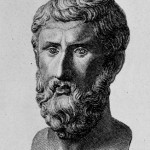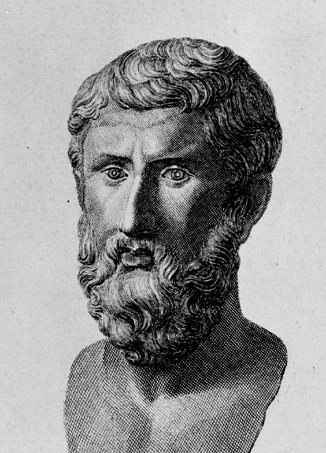An Exercise in Epicurean Rules of Evidence: Authorized Doctrine 24
 “The wise man does not hesitate to hold as true that which is established by the evidence within his reach, nor does he ever hold as true that which is not established by such evidence.”
“The wise man does not hesitate to hold as true that which is established by the evidence within his reach, nor does he ever hold as true that which is not established by such evidence.” Strodach: If you summarily rule out any single sensation and do not make a distinction between the element of belief that is superimposed on a percept that awaits verification and what is actually present in sensation or in the feelings or some percept of the mind itself, you will cast doubt on all other sensations by your unfounded interpretation and consequently abandon all the criteria of truth. On the other hand, in cases of interpreted data, if you accept as true those that need verification as well as those that do not, you will still be in error, since the whole question at issue in every judgment of what is true or not true will be left intact.
Epicurus.info: If you arbitrarily reject any one sensory experience and fail to differentiate between an opinion awaiting confirmation and what is already perceived by the senses, feelings, and every intuitive faculty of mind, you will impute trouble to all other sensory experiences, thereby rejecting every criterion. And if you concurrently affirm what awaits confirmation as well as actual sensory experience, you will still blunder, because you will foster equal reasons to doubt the truth and falsehood of everything.
Epicurus.net: If you reject absolutely any single sensation without stopping to distinguish between opinion about things awaiting confirmation and that which is already confirmed to be present, whether in sensation or in feelings or in any application of intellect to the presentations, you will confuse the rest of your sensations by your groundless opinion and so you will reject every standard of truth. If in your ideas based upon opinion you hastily affirm as true all that awaits confirmation as well as that which does not, you will not avoid error, as you will be maintaining the entire basis for doubt in every judgment between correct and incorrect opinion.
And here are several other related references:
Lucretius De Rerum Natura Book IV: Many are the marvels … we see which seek to shake the credit of the senses. But such efforts are quite in vain, since the greatest part of these cases deceive us on account of the opinions which we add ourselves, taking things as seen which have not been seen by the senses. For nothing is harder than to separate those facts that are clearly true from those that are doubtful which the mind adds itself.
Diogenes Laertius: The Epicureans refer to ‘opinion’ as supposition, and say that it is at times true, and at times false. An opinion which is supported by evidence, and is not contradicted by other evidence is true. An opinion which is not supported by evidence, and is contradicted by other evidence, is false. On this account they have introduced the expression of “waiting,” such as when, before pronouncing that a thing seen is a tower, we must wait until we approach it, and learn what it looks like when we are nearby.
Epicurus’ Letter to Pythocles: “We do not seek to wrest by force what is impossible, nor to understand all matters equally well, nor make our treatment always as clear as when we discuss human life or explain the principles of physics in general—for instance, that the whole of being consists of bodies and intangible nature, or that the ultimate elements of things are indivisible, or any other proposition which admits only one explanation of the phenomena to be possible. But this is not the case with celestial phenomena: these at any rate admit of manifold causes for their occurrence and manifold accounts, none of them contradictory of sensation, of their nature. ***For in the study of nature we must not conform to empty assumptions and arbitrary laws, but follow the promptings of the facts; for our life has no need now of unreason and false opinion; our one need is untroubled existence. All things go on uninterruptedly, if all be explained by the method of plurality of causes in conformity with the facts, so soon as we duly understand what may be plausibly alleged respecting them. BUT WHEN WE PICK AND CHOOSE AMONG THEM, REJECTING ONE EQUALLY CONSISTENT WITH THE PHENOMENA, WE CLEARLY FALL AWAY FROM THE STUDY OF NATURE ALTOGETHER AND TUMBLE INTO MYTH.****
* * * * * *
So consider: “The wise man does not hesitate to hold as true that which is established by the evidence within his reach, nor does he ever hold as true that which is not established by such evidence.” Does this go too far, or not far enough? Certainly it leaves out several details and important principles, but is it correct as far as it goes?
Maybe you would prefer one of these two other alternate constructions:
- The wise man does not doubt that which is established by the evidence within his reach, nor does he have faith in that which is not established by such evidence.
- The wise man does not doubt that which is established by the evidence within his reach, nor does he trust in that which is not established by such evidence.
Perhaps one day we will recover Epicurus’ volume on the Canon of Truth. Until we do, however, the material left to us on Epicurus’ thinking as to the meaning of “true reason” is worthy of close study.

